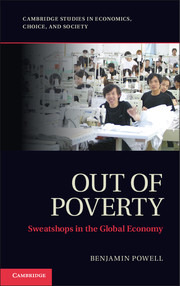Book contents
- Frontmatter
- Contents
- Figures
- Tables
- Acknowledgments
- Preface
- 1 Introduction
- 2 The Anti-Sweatshop Movement
- 3 The Economics of Sweatshop Wage Determination
- 4 Don’t Cry for Me, Kathie Lee
- 5 Health, Safety, and Working Conditions Laws
- 6 Save the Children?
- 7 Is It Ethical to Buy Sweatshop Products?
- 8 A History of Sweatshops, 1780–2010
- 9 The Process of Economic Development
- 10 What Good Can Activists Do?
- 11 Conclusion
- References
- About the Author
- Index
- References
9 - The Process of Economic Development
Published online by Cambridge University Press: 05 June 2014
- Frontmatter
- Contents
- Figures
- Tables
- Acknowledgments
- Preface
- 1 Introduction
- 2 The Anti-Sweatshop Movement
- 3 The Economics of Sweatshop Wage Determination
- 4 Don’t Cry for Me, Kathie Lee
- 5 Health, Safety, and Working Conditions Laws
- 6 Save the Children?
- 7 Is It Ethical to Buy Sweatshop Products?
- 8 A History of Sweatshops, 1780–2010
- 9 The Process of Economic Development
- 10 What Good Can Activists Do?
- 11 Conclusion
- References
- About the Author
- Index
- References
Summary
The process of economic development has been the greatest poverty cure in human history. Over the past 200 years, this process has eradicated countless sweatshops and replaced them with better jobs. Understanding this process is crucial for those who want to improve the lives of today’s sweatshop workers.
People living in First World countries today often seem to forget that their living standards are the exception, not the norm, in our history. Most of man’s existence has been mired in poverty with prospects for a short life and famine a constant threat. Great Britain and the United States were among the first countries to break out of that dismal cycle. Fortunately, many other countries have joined them today.
To achieve and maintain a high standard of living, a country’s workers need to have a high level of productivity. In other words, they need to get a lot of valuable output for every hour they work. The proximate causes of high productivity are physical capital, human capital, and technology. Sweatshops play a role in increasing all three of these.
- Type
- Chapter
- Information
- Out of PovertySweatshops in the Global Economy, pp. 127 - 137Publisher: Cambridge University PressPrint publication year: 2014



